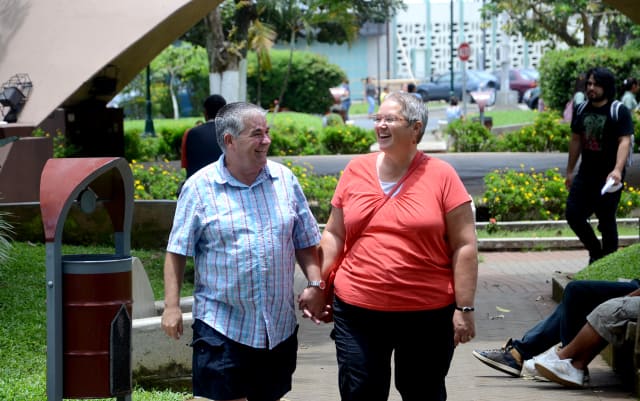When United States citizens Jerri and Daniel Spitzer go out for dinner on a Friday night, their conversation always is dominated by one topic: the progress of their students in the Community Conversation Program.
The growth of the government’s initiative, designed to assist Costa Ricans in learning English, has been such that new people are being sought to join volunteers like the Spitzers, who dedicate a couple of hours a week to speaking English with Costa Ricans.
With more than 30 groups in four provinces, 250 registered volunteers and even its own page on the social networking site Facebook, the initiative is fast helping the government achieve its goal of providing English training to 35,000 Costa Ricans by the end of this year.
“We are absolutely begging for more volunteers right now,” said Jerri, formerly a piano teacher from the U.S. state of Virginia. “All they have to do is speak English. It’s not really teaching, but rather conversation.
“The Costa Ricans who come along are just so grateful to have someone to practice their English with that it makes you so happy to help. I have made so many new friends and learned so much about different people from doing this.
“When Daniel and I go out for dinner after class, all we find ourselves talking about is the how the class went”.
The program is just one of many that fall under the Arias government’s Costa Rica Multilingual initiative, designed to assist Costa Ricans learn a new foreign language.
The success of the program has depended not only on the generosity of its volunteers, but also on the willingness of local organizations such as schools, community centers, libraries and churches to provide space where the conversation classes can take place.
Katherine Stanley, co-coordinator for Costa Rica Multilingual, said, “As word-of mouth spreads, we are finding that people, even before arriving in Costa Rica, are signing up as volunteers for the program because they realize it is a great way to meet Costa Ricans and get to know their community better.
“In return for volunteering just an hour a week, they themselves learn those important little things from their Costa Rican conversation partner, like the best place to buy bread or the best places to eat out. My hope is that it will eventually become part of the expat experience.”
Volunteers are not required to have teaching experience, but simply a high level of spoken English.
The program itself was originally designed for Costa Rican teachers of English to improve their oral skills. Such has been the interest from the general public that the program has been opened to everyone, providing they first have a basic grasp of the English language.
As well as conversation classes, innovative volunteers also have arranged for karaoke evenings in English and theater workshops given by the Little Theatre Group, all with the aim of helping Costa Ricans learn English in a relaxed atmosphere.
“We started off with set topics of conversation but, as volunteers and their partners got to know each other, they started choosing their own topics and it really took off. It really is up to the volunteer and partner to decide how they want to structure the hour,” Stanley said.
While Costa Rica Multilingual’s short-term goal is aimed at 35,000 Costa Ricans, officials hope that it will have a long-standing impact on the country. By 2017, the plan guarantees that 100 per cent of high school students will graduate with an intermediate to advanced level of English.

